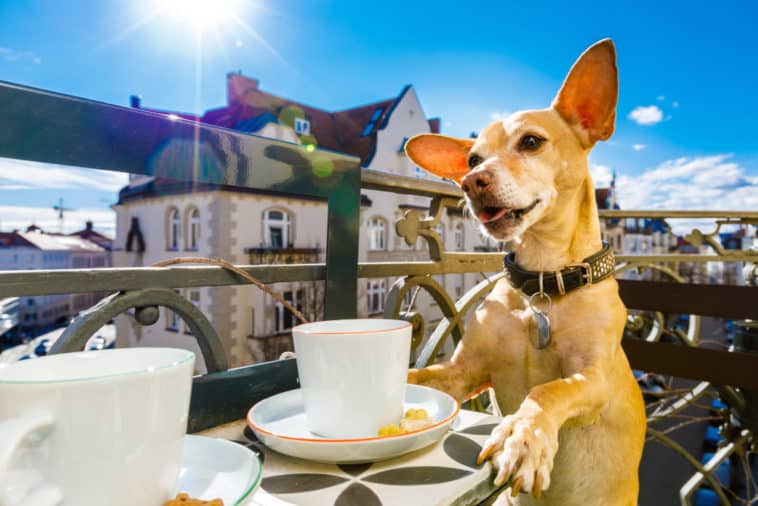The puppy eyes our dogs give us as we’re munching away on some food can often be too tempting to resist, even when we know we shouldn’t give in.
Whether it’s a piece of toast at breakfast or a block of chocolate in the evening, the adoring gaze of a dog is enough to compel even the strongest will to share their meal.
However, many of the things we ingest daily can make our dogs very ill. One of these foods, Coffee, which many people drink every day, is particularly harmful for dogs.
Table of Contents
Why Do Dogs Like Coffee?
Dogs are naturally curious animals and often driven by their stomachs. They’ll taste whatever food or drink they can, so it’s hardly surprising that the strong scent and bitter taste of coffee is a tempting treat.
This temptation has only been intensified with more people spending time at time. In fact, the Pet Poison Helpline has reported a 220% increase in calls related to brewed coffee over the past year.
Affect On Dogs
Caffeine is a stimulant that affects the heart and nervous system when consumed. This is similarly the case for dogs, however, their tolerance dramatically differs from the 400 mg that most humans can safely ingest per day.
It only takes a small amount of caffeine, even for larger dogs, to have a toxic effect. The size of your dog and the amount ingested will then determine the severity of the symptoms.
For smaller breeds such as Chihuahuas, only 3 oz. of regular brewed coffee can cause illness, while larger breeds such as Golden Retrievers would need to consume a little more to reach toxic levels.
Caffeine Poisoning
Some of the most severe symptoms of caffeine poisoning in dogs can appear within an hour of consumption. These symptoms can last anywhere between 12 hours to several days.
If your pooch has only ingested a small amount of caffeine, you may notice them acting a little more hyperactive or stranger than usual. However, some of the stronger symptoms can quickly become more serious.
Listed below are some of the common signs of caffeine poisoning to look out for.
- Panting
- Agitation and restlessness
- Vomiting and diarrhea
- Loss of muscle control
- Elevated heat rate
- Abnormal heart rhythms
- Elevated blood pressure
In severe cases, caffeine poisoning can cause collapsing, tremors, and seizures. Excessive amounts can also kill your dog, although the lethal dose of caffeine varies, depending on the size and health of your dog.
Needless to say, caffeine poisoning in dogs isn’t something to be taken lightly. Once you’ve identified the problem, the quicker you’re able to take them to a veterinarian and get treated, the greater the chance of a full recovery. Most dogs will survive caffeine poisoning as long as they get help quickly.
Veterinary Treatment
If you believe your dog has ingested caffeine, either by drinking coffee, eating coffee grounds, or consuming a type of caffeine product, it’s essential that you immediately take them to the veterinarian for an examination.
Treatment often includes inducing vomiting, which is particularly useful if it’s within a few hours of your dog ingesting the caffeine.
Other methods of treatment and assessment include heart rate and blood pressure monitoring, medications for tremors and seizures (if applicable), and checking blood parameters to monitor organ function.
If, for whatever reason your veterinarian is unavailable, try to contact a pet poison center and take your pooch to the nearest emergency facility.
Once your dog’s been treated and they begin to recover, it’s worth scheduling a follow-up appointment with your veterinarian to ensure your dog’s health hasn’t been significantly compromised.
Sources Of Caffeine
Coffee isn’t the only source of caffeine to keep out of your dog’s reach. There are a number of other sources commonly found in most households that pose an equally dangerous risk to dogs if not stored correctly.
Some of these include:
- Tea
- Caffeine supplements
- Diet pills
- Energy drinks
- Soda
- Chocolate
- Guarana
- Decaffeinated coffee and tea
Keeping the following away from your dog is essential and paramount to their health and wellbeing.

How To Prevent Caffeine Consumption
As explained above, keeping all caffeinated products off the ground and out of your dog’s reach is the best method of preventing caffeine consumption.
So, when throwing caffeinated products into the trash, make sure you’ve closed up or sealed the trash bag and its contents are completely inaccessible to your dog. This is especially important if your dog has a tendency to rummage through the trash.
While it’s fun to give your pooch plenty of treats to keep them happy, offering your dog a caffeinated treat such as a large chunk of chocolate is extremely irresponsible and can prove fatal.
Therefore, if you’re ever unsure whether your dog can ingest a certain type of food or drink treat, it’s always best to err on the side of caution. Moreover, it’s also advisable to consult a veterinarian before adding anything new to your dog’s day-to-day diet.
Finally, remind your children, friends, family, and any other visitors, that coffee and caffeinated products need to be kept away from your dog. This will prevent any accidental consumption and reduce the likelihood of caffeinated products being left lying around.
Frequently Asked Questions
Can My Dog Drink Tea?
Tea is caffeinated so it’s strongly recommended not to let your dog drink it. As this guide has explained, caffeine is toxic and can cause a number of dangerous symptoms in dogs.
While it’ll take a fair amount of tea to harm your pooch, there are very few benefits that make it worth sharing.

